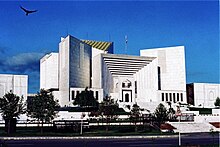Qazi Faez Isa
Qazi Faez Isa قاضی فائز عیسی | |
|---|---|
| Justice of the Supreme Court of Pakistan | |
| Assumed office 5 September 2014 | |
| Chief Justice of Balochistan High Court | |
| In office 5 August 2009 – 5 September 2014 | |
| Preceded by | Amanullah Khan Yasinzai |
| Succeeded by | Ghulam Mustafa Mengal |
| Justice of the Balochistan High Court | |
| In office 5 August 2009 – 5 September 2014 | |
| Personal details | |
| Born | 26 October 1959[1] Quetta, Balochistan, Pakistan |
| Nationality | Pakistani |
| Parent(s) | Qazi Mohammad Isa (father)[2] |
Qazi Faez Isa (Urdu: قاضی فائز عیسی, born 26 October 1959) is a justice of the Supreme Court of Pakistan since 5 September 2014. Previously, he served as Chief Justice of the Balochistan High Court from 5 August 2009 to 5 September 2014.[1][3]
Early life and education[]
Isa was born in Quetta, Balochistan, on 26 October 1959.[3] He is the son of Qazi Muhammad Essa, a Pakistani politician and independence movement activist who was a close associate of Muhammad Ali Jinnah.[3][4] Isa's paternal grandfather was the Prime Minister of the Kalat State.[2][5] He is of Hazara descent.[4] The diplomat Ashraf Jehangir Qazi is his first cousin, and Jennifer Musa is his aunt through marriage to his paternal uncle Qazi Muhammad Musa.[5]
He completed his primary and secondary education in Quetta, did his "O" and "A" levels from Karachi Grammar School and went on to do B.A. (Honours) in Law, from London. He completed his Bar Professional Examination from the Inns of Court School of Law, London, and was called to the Bar of England and Wales (Middle Temple, 1982).[1][3]
Professional career[]
He enrolled as an Advocate of the Balochistan High Court on 30 January 1985 and as an Advocate Supreme Court on 21 March 1998.
He practiced law for over 27 years before all the High Courts of Pakistan, the Federal Shariat Court, and the Supreme Court of Pakistan, and was a member of the Balochistan High Court Bar Association, Sindh High Court Bar Association and Life Member of the Supreme Court Bar Association of Pakistan. Before his elevation, he was a senior partner and head of litigation in one of Pakistan's leading law firms. From time to time he was called upon by the High Courts and the Supreme Court as amicus curiae, and rendered assistance in certain complicated cases. He has also conducted international arbitrations. Innumerable cases, in which he appeared as Counsel, have been reported in law journals.[3][6]
Isa served as a member of the Pakistan Law and Justice Commission, the National Judicial (Policy Making) Committee and the Federal Judicial Academy. In his capacity as the Chief Justice of the Balochistan High Court, he is also the ex-officio Chairman of the Balochistan Judicial Academy. As the senior most Chief Justice of a High Court Isa served as a member of the Supreme Judicial Council.[1][3]
Qazi Faez Isa was promoted to become a judge of the Supreme Court of Pakistan on 5 September 2014 and is currently serving there as a judge in 2021.[1][3]
References[]
- ^ a b c d e "Profile of Justice Qazi Faez Isa on Baluchistan High Court website". Retrieved 27 August 2021.
- ^ a b National Institute of Historical and Cultural Research 1998.
- ^ a b c d e f g "Profile of Justice Qazi Faez Isa". Supreme Court Of Pakistan website. Retrieved 28 August 2021.
- ^ a b Javed, Saleem (29 June 2012). "Hope fades away for Hazaras of Pakistan". Dawn. Archived from the original on 21 February 2019. Retrieved 9 June 2020.
Hazaras also played an important role in the formation of Pakistan. A Hazara politician, Qazi Mohammad Essa (his son, Faiz Essa, is the present Chief Justice of Balochistan High Court), was the founder of Balochistan Muslim League who represented Balochistan in Lahore Resolution in 1940.
- ^ a b Owen O’Shea; Gordon Revington (8 October 2018). Century of Politics in the Kingdom: A County Kerry Compendium. Merrion Press. pp. 103–. ISBN 978-1-78537-203-2.
- ^ (Abbas Nasir) 'Thank you, Justice Isa' (Profile of Justice Qazi Faez Isa) Dawn (newspaper), Published 17 December 2016, Retrieved 27 August 2021
Bibliography[]
- Pakistan Journal of History and Culture, Volume 19, Pakistan: National Institute of Historical and Cultural Research, 1998, p. 124
- Pakistani law biography stubs
- 1959 births
- Living people
- Justices of the Supreme Court of Pakistan
- Pakistani jurists
- Pakistani people of Hazara descent
- People from Quetta
- Karachi Grammar School alumni
- Chief Justices of the Balochistan High Court
- Qazi family
